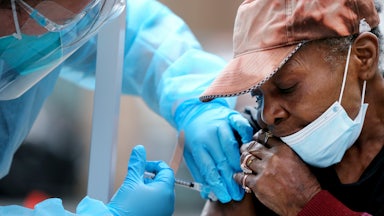Even the most cautious voices now seem to agree that we’ve reached a turning point in the fight against the Covid-19 pandemic. With three vaccines authorized, and a production deal recently brokered by the Biden administration between the pharmaceutical giants Merck and Johnson & Johnson, the available supply is ramping up. Dr. Anthony Fauci, the country’s coronavirus czar, said that vaccination may be open to all Americans by April. President Biden has set a similar marker for May.
That’s good news, particularly as optimism has felt hard to come by in the last year. It’s also good—and exceedingly profitable—news for companies that are using the opportunity to gobble up valuable consumer data, recruit new customers, and sell boondoggle software to federal and local governments. The vaccine grift is on.
Big pharmacies and retailers are some of the unintended winners of the pandemic. A recent Wall Street Journal report illustrates how companies like CVS and Walgreens are using the vaccination process to gather more information about customer behavior, tracking people from the moment they register online (which signs them up for marketing newsletters) and while they are waiting for their shot.
Under normal circumstances, some of these people would have no inclination to enter one of these stores. “Every one of these customers is coming through our digital front end, so we have their email, we have their text message, and we have the ability to communicate with them regularly,” Jonathan Roberts, CVS’s chief operating officer, told the Journal, perhaps failing to realize just how creepy this sounds. A desire to avoid death and hospitalization from a virus isn’t exactly the same thing as a longing to build a relationship with a massive pharmacy chain.
In effectively deputizing private chains to perform essential state functions, the government is more or less funneling “legions of new customers” to major retailers, including Walmart and Kroger. As the Journal noted, vaccine recipients represent a captive audience, obliged to spend time in front of store displays customized for the recently inoculated (pain relievers, ice packs, etc.). Retailers are hoping to leverage this opportunity, emphasizing the importance of “the 15 minutes that vaccine recipients are told to remain on site to ensure no adverse reactions to the shots.”
It’s not as if businesses aren’t expected to sell to potential customers—that’s the whole point. But the crass commercial underpinnings of America’s vaccine distribution reflect a country in which every public good has either been privatized or relegated to the military, seemingly one of the last competent—and well-resourced—institutions in American life. Rather than a functioning universal health care system that brings vaccines to people in their homes, we have a patchwork, ranging from concierge health care allegedly sneaking wealthy clients to the front of the line to difficult-to-navigate public systems that have so far failed to address equity in distribution at scale. In general, people are left to fend for themselves. That makes them easy prey for companies that wish to monetize their vaccination experience.
In leveraging a public crisis for private gain, some companies have distinguished themselves. Palantir, the secretive data-crunching company co-founded by Peter Thiel, has earned millions in government contracts to provide software that, according to various reports, hardly works at all. Buoyed by Thiel’s relationship with former President Trump, Palantir has become one of the government’s go-to sources for pandemic data-processing tools. (Thiel is unlikely to have such a chummy relationship with President Biden, but Palantir, which was funded partly by In-Q-Tel, the CIA’s venture capital arm, already benefits from commercial relationships with various intelligence agencies and the Department of Defense.)
Announced in October as part of the comically named Operation Warp Speed, Palantir’s Tiberius software was supposed to help state and municipal officials track and manage vaccine distribution. (Like Warp Speed, Tiberius is a Star Trek reference: It’s the middle name of Captain James T. Kirk.) Like a program Palantir provided for the Department of Health and Human Services, Tiberius would be a privacy-friendly effort, with no personal health data collected, officials said. Instead, the software would work off broader anonymized data, such as demographic and employment information. Overall, the program touted access to 187 different data sets, according to HHS. Information about numbers of cases, hospital capacity, and available inventory could be used to target vaccines appropriately. Keen algorithmic decision-making would help tackle supply-chain bottlenecks as they appear.
But there was a big problem: Tiberius didn’t work as intended. The software was difficult to navigate and largely duplicated the functionality of other tools; cities and other municipalities found they had better data than Palantir was providing. Officials like Senator Elizabeth Warren also expressed concern about Palantir’s track record with data privacy. (In the United Kingdom, activists sued the National Health Service over a deal it made with Palantir to process health data.)
Palantir’s notoriety derives as much from its closeness to the intelligence world and unsavory figures like Thiel and Trump as it does from its crummy software. The company is both feared as an amoral, data-hungry predator and mocked for its overrated products. This mixed reputation has been borne out in the company’s pandemic work. As USA Today found in a recent investigation, “for many states, Tiberius proved either so irrelevant or so complicated that the only incentive for them to log on each week is to check the most basic of numbers: how many doses of vaccine they’re getting.” One doctor told the newspaper, “The rocky deployment of Tiberius exposed Operation Warp Speed’s lack of understanding of public health in America.”
Eventually, most people in the U.S. will be vaccinated, and perhaps this process will be regarded retrospectively as a success. There is little doubt, after all, that the actual development of these vaccines represented a scientific triumph. But it’s clear, even now, that the federal government, from Trump to Biden, has deputized companies to perform state functions—and to use the opportunity to build their customer base. Vaccine distribution represented a chance to rebuild our health care infrastructure in the spirit of a public good, without all the complications of rent-seeking surveillance capitalists. Instead, as Americans flounder within a broken system, the country’s corporations remind us who, quite literally, calls the shots.








